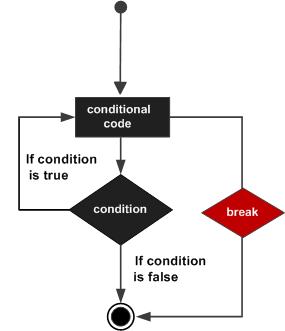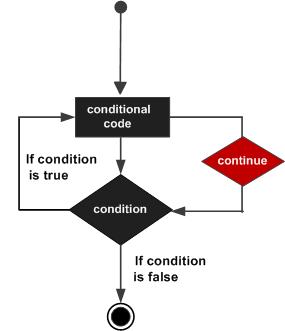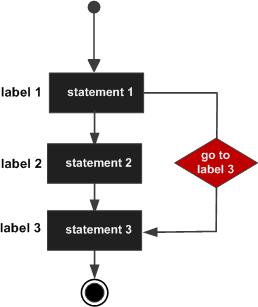Break Statesmen in C
The break statement in C programming has the following two usages −
- When a break statement is encountered inside a loop, the loop is immediately terminated and the program control resumes at the next statement following the loop.
- It can be used to terminate a case in the switch statement (covered in the next chapter).
If you are using nested loops, the break statement will stop the execution of the innermost loop and start executing the next line of code after the block.
Syntax
The syntax for a break statement in C is as follows −
break;
Flow Diagram

Example
#include <stdio.h> int main () { /* local variable definition */ int a = 10; /* while loop execution */ while( a < 20 ) { printf("value of a: %d\n", a); a++; if( a > 15) { /* terminate the loop using break statement */ break; } } return 0; }
When the above code is compiled and executed, it produces the following result −
value of a: 10 value of a: 11 value of a: 12 value of a: 13 value of a: 14 value of a: 15
Continue Statement in C
The continue statement in C programming works somewhat like the breakstatement. Instead of forcing termination, it forces the next iteration of the loop to take place, skipping any code in between.For the for loop, continue statement causes the conditional test and increment portions of the loop to execute. For the while and do...while loops,continue statement causes the program control to pass to the conditional tests.Syntax
The syntax for a continue statement in C is as follows −continue;Flow Diagram
Example
#include <stdio.h> int main () { /* local variable definition */ int a = 10; /* do loop execution */ do { if( a == 15) { /* skip the iteration */ a = a + 1; continue; } printf("value of a: %d\n", a); a++; } while( a < 20 ); return 0; }When the above code is compiled and executed, it produces the following result −value of a: 10 value of a: 11 value of a: 12 value of a: 13 value of a: 14 value of a: 16 value of a: 17 value of a: 18 value of a: 19Goto Statement in C
A goto statement in C programming provides an unconditional jump from the 'goto' to a labeled statement in the same function.NOTE − Use of goto statement is highly discouraged in any programming language because it makes difficult to trace the control flow of a program, making the program hard to understand and hard to modify. Any program that uses a goto can be rewritten to avoid them.Syntax
The syntax for a goto statement in C is as follows −goto label; .. . label: statement;Here label can be any plain text except C keyword and it can be set anywhere in the C program above or below to goto statement.Flow Diagram
Example
#include <stdio.h> int main () { /* local variable definition */ int a = 10; /* do loop execution */ LOOP:do { if( a == 15) { /* skip the iteration */ a = a + 1; goto LOOP; } printf("value of a: %d\n", a); a++; }while( a < 20 ); return 0; }When the above code is compiled and executed, it produces the following result −value of a: 10 value of a: 11 value of a: 12 value of a: 13 value of a: 14 value of a: 16 value of a: 17 value of a: 18 value of a: 19



No comments:
Post a Comment